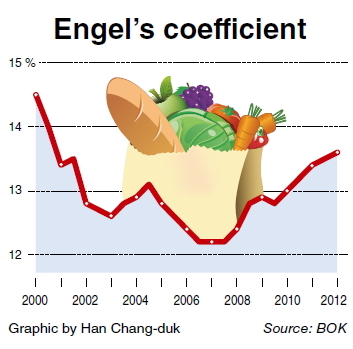
The economic slowdown has decelerated the growth of consumption, but higher expenditure on food and beverages has resulted in the highest Engel’s coefficient in 11 years.
The Bank of Korea said Tuesday that household consumption reached 324 trillion won ($297 billion) in nominal terms in the first six months of 2012, up just 2 percent from a year earlier.
In contrast, spending on food and non-alcoholic beverages climbed 6.3 percent to 44 trillion won over the corresponding period.
As a result, the Engel’s coefficient came to 13.6 percent, the highest since the first half of 2001, when the figure reached 14 percent.
Devised by German economist Ernst Engel, the coefficient is the proportion of expenditure that is spent on food. It is high for poor homes and countries, and lower for wealthy ones.
The rising figure suggests that Asia’s fourth-largest economy is slipping economically.
No matter how much income falls, people cannot slash their spending on food proportionately, as they need to eat. In other words, the demand for food is not elastic, which is why underdeveloped nations maintain a high Engel’s coefficient.
“From an economic perspective, the rise was mostly caused by the economic downturn,” a Hyundai Research Institute research fellow said.
He said that market conditions felt by households especially worsened over the past few years as global prices of food and farm products increased significantly.
Apparently, consumers are already spending less on unnecessary items. The amount spent on alcoholic beverages and tobacco in the first half of the year accounted for 2.13 percent of total spending by households, which is the lowest since such data began to be compiled in 1970.
Spending on clothes also dropped to 5.1 percent of the total from 5.5 percent in the fourth quarter of 2007, with the amount spent on private education also shrinking from 7.7 percent in late 2008 to 6.6 percent in the second quarter of this year, according to the data.
An economist at LG Economic Research Institute said that people are cutting down their spending on items that are not absolutely necessary, despite an increase in household income.
By Kim Yon-se (
kys@heraldcorp.com)








